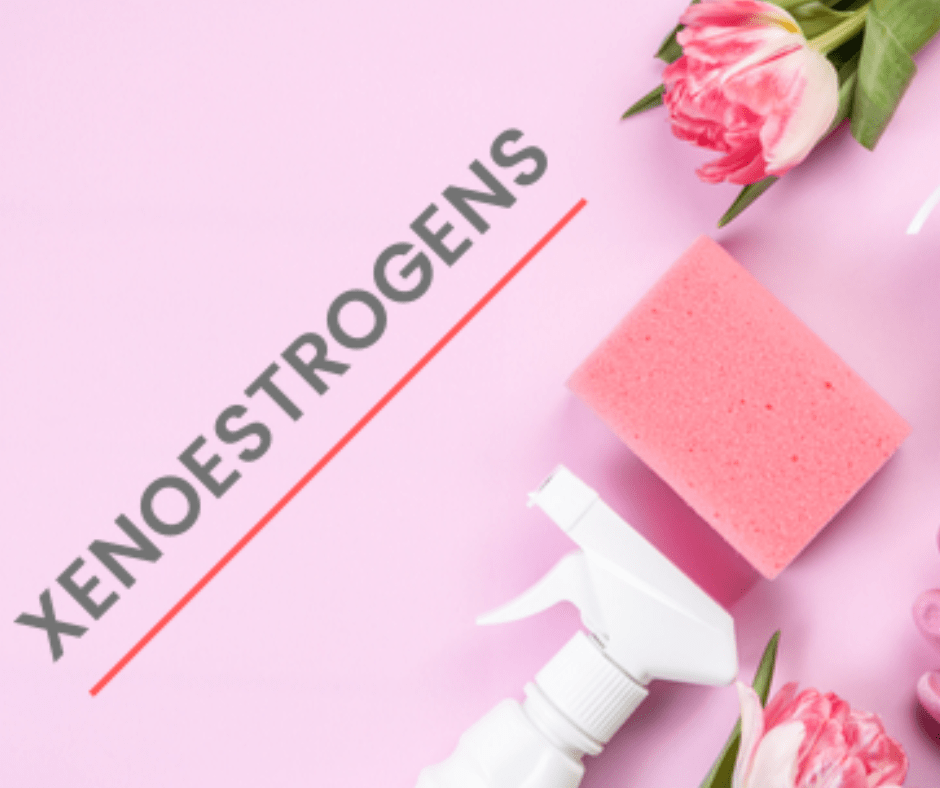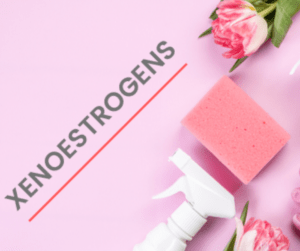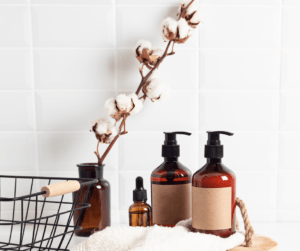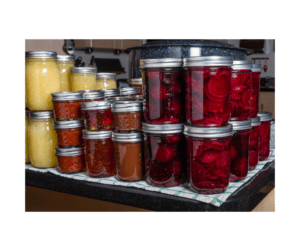
We take advantage of everything life offers like food, products, and all the pleasurable comforts of life. Not to spoil anything – but did you know that by accepting everything in, xenoestrogens assault your body in secret?
Xenoestrogens affect menopause in a big way! They are fake estrogens that disrupt hormone balance and worsen menopause symptoms.
The term “endocrine disruptors” refers to a group of man-made chemicals that can affect hormones in humans and animals. These substances may be synthetic or natural, but they all can disrupt the normal functioning of hormones by mimicking their effects. They are often found in personal care products such as soaps, shampoos, and lotions because they help these items stay on longer without washing off quickly. So what are environmental estrogens?
What are xenoestrogens?

Xenoestrogens, also known as man-made estrogens, mimic the effects of estrogen in the body. They are found in synthetic products such as plastics, pesticides, or even natural products like soybeans.
How do they affect your body?
Xenoestrogens have been linked to health problems such as hormone-related cancers (breast and prostate), infertility, and early puberty in girls. They may also increase your risk for cardiovascular disease by increasing fat around your abdomen (belly fat). In addition, researchers believe exposure to environmental estrogens may be responsible for some male reproductive disorders, including low sperm count and testicular cancer.* How can you avoid xenoestrogens? The most common way is avoiding plastic containers because they contain chemicals called phthalates which act like estrogen when absorbed into our bodies through food or liquids stored inside them.* Are there any alternatives if I’m worried about exposure? Yes! Many companies are now making BPA-free containers so consumers can still store their food safely without worrying about chemicals leaching into their food supply. I like to use glass mason jars for everything storage. Click here to purchase.
Since the FDA banned BPA in baby bottles and sippy cups, we have seen a dramatic increase in the use of glass containers. However, many consumers are unaware that other harmful chemicals, such as phthalates, can leach into your food from plastic containers. Therefore, always opt for BPA-free products when shopping for plastic containers and food storage items.
Xenoestrogens mimic the effects of estradiol, a natural estrogen produced by women. A study published in Environmental Health shows that the development of male offspring is affected by xenoestrogens. The researchers studied pregnant mice and rats exposed to BPA (bisphenol A), a chemical found in plastics and food packaging; phthalates, which make plastic softer; and coumestrol, an animal feed additive that mimics estrogen. They found that all three chemicals had similar effects on male offspring: they altered their reproductive systems and caused them to grow smaller testicles than usual.
The researchers concluded that these chemicals could affect humans as well–and even though we don’t know exactly how much exposure is safe for us yet, it’s clear we should avoid them whenever possible!
It’s important to note that the mice and rats in this study were exposed to high doses of BPA, phthalates, and coumestrol. These chemicals are found in everything from plastic bottles to food packaging, so you’re unlikely to avoid them altogether. However, you can control your exposure by choosing products with fewer chemicals on the ingredients list and avoiding those that contain these specific substances.
The association between exposure to environmental estrogens and the risk of breast cancer in women.
Xenoestrogens are man-made chemicals that mimic the effects of estrogen on the body. They can be found in personal care products, like shampoo, makeup, pesticides, and plastics.
Xenoestrogens have been linked with breast cancer in women, with high levels circulating through their bodies. A review published in Panminerva Medica reviewed the association between exposure to environmental estrogens and the risk of breast cancer in women. The study showed that women with higher xenoestrogen levels were more likely to develop breast cancer than those with no or who only had low levels present.
High levels of xenoestrogens are strongly associated with endometriosis, a condition characterized by painful periods, pelvic pain, and infertility.
Xenoestrogens are a class of chemicals that mimic estrogen, and they’re found in many personal care products and food.
Xenoestrogens can be produced naturally or synthetically (also called “endocrine disruptors”). Synthetic forms include butylparaben (a preservative), bisphenol A (BPA) used to make plastic bottles and cans, phthalates (used as fragrance carriers in cosmetics), propylparaben (another preservative), and triclosan (an antibacterial agent).
Natural sources include soybeans; flaxseed lignans; hops; black cohosh root bark; red clover flowers; licorice root; and garlic. The studies show that xenoestrogens can mimic estrogen in the body and block its natural effects. They may also increase estradiol levels naturally produced by women’s ovaries.
A research paper published in Nature showed that phytoestrogen’s effects differ from those of xenoestrogens.

Phytoestrogens are plant-based estrogens from food sources like tempeh, barley, lentils, yams, alfalfa, apple, and pomegranate. They’re not man-made.
Phytoestrogens have been linked to several health benefits, including reducing the risk of osteoporosis (bone loss) and menopausal symptoms such as hot flashes and night sweats. In addition to these benefits, they help regulate cholesterol levels in your body. Hence, they are beneficial if you have high blood pressure or high cholesterol levels and help reduce risks associated with type 2 diabetes, which can cause damage over time, affecting organs such as kidneys & eyesight!
Phytoestrogens help the body process nutrients in food more efficiently, which can help you lose weight. They also help reduce menopausal symptoms like hot flashes, night sweats, and mood swings by balancing hormones in your body.
Check your personal care products for synthetic ingredients that may contain xenoestrogens.

Xenoestrogens can be found in a variety of products. To be sure you’re avoiding them:
- Check the labels on your personal care products.
- In addition, avoid parabens and phthalates, which are common chemicals that mimic estrogen (a hormone responsible for sexual development).
- Avoid BPA (bisphenol A), a plastic used to make bottles and cans linked to reproductive problems in children and cancer risk factors for adults. If you prefer plastic, look for BPA-free. I love my Stanley cup for water and refill it when empty. Click here to purchase.
If you’re still unsure what ingredients may contain xenoestrogens or other harmful chemicals, look for products labeled “natural” or “organic.” These items are likely made without any synthetic ingredients whatsoever!
If you’re looking for ways to reduce your exposure to xenoestrogens, try these tips:

Avoid plastics whenever possible. Use glass bottles and containers instead of plastic ones. I like mason jars. Click here to purchase.
Also, avoid the use of canned foods, which often contain BPA. Look for BPA-free.
Wash fruits and vegetables thoroughly before eating them. Try and purchase organic whenever possible.
Conclusion
In conclusion, environmental estrogens are very common in our life. They can be found in a wide range of products, including plastics and cosmetics, which means there are many ways they could enter your body. The most dangerous form of these chemicals is BPA because it mimics estrogen closely, but we should all be wary of these toxins because they may have serious health effects on both men and women alike.
Looking for more information about menopause? Click here for an article on if menopause is affecting your day-to-day life.
What are your thoughts about this article? Comment below with your thoughts or concerns, I would love to know. XOXO Mary



